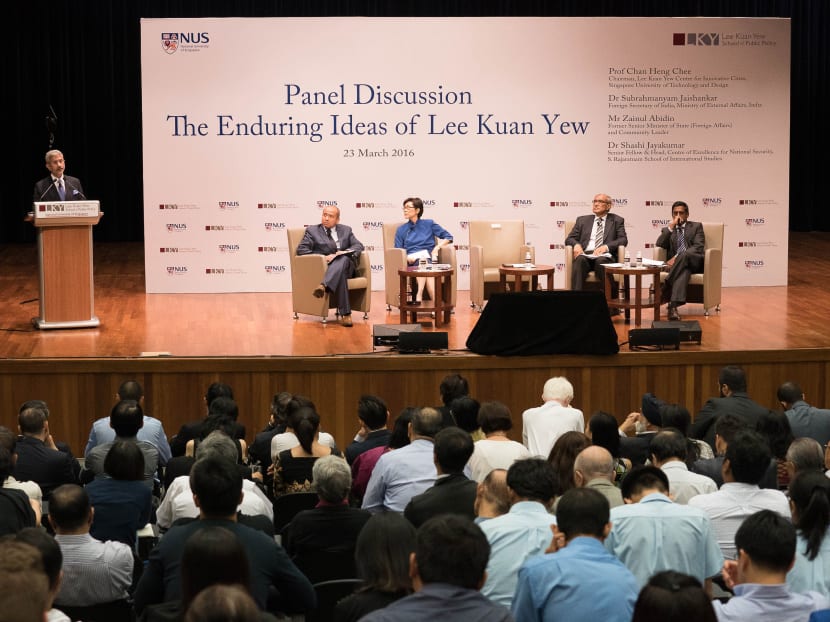Mr Lee Kuan Yew a ‘geopolitical guru’ who had the world listening: Indian diplomat
SINGAPORE — Singapore’s founding Prime Minister Lee Kuan Yew not only built “Brand Singapore”, but was the brand-builder for Asia’s modern leadership in many ways, a senior Indian official said on Wednesday (March 23).

Dr Subrahmanyam Jaishankar, Foreign Secretary of India, Ministry of External Affairs, India delivers his speech at The Enduring Ideas of Lee Kuan Yew Forum to commemorate the legacy of Singapore’s founding Prime Minister on his first death anniversary. Photo: Ray Chua
SINGAPORE — Singapore’s founding Prime Minister Lee Kuan Yew not only built “Brand Singapore”, but was the brand-builder for Asia’s modern leadership in many ways, a senior Indian official said on Wednesday (March 23).
And after being “a driver of development” and serving as “an example for the continent”, he evolved in the eyes of the world to be “sort of a geopolitical guru”, guiding Asia and explaining the continent to the rest of the world, Indian Foreign Secretary Subrahmanyam Jaishankar added.
“It was no longer Asia that was listening to him, it was also Europe, the United States,” the official said, having previously interacted with Mr Lee during his time as India’s High Commissioner to Singapore from 2007 to 2009.
Dr Jaishankar was a speaker at a forum attended by about 600 participants made up of diplomats, academics and students, to discuss the late leader’s changes to policies and enduring ideas, organised by the Lee Kuan Yew School of Public Policy and National University of Singapore.
For Asian leaders such as Indian Prime Minister Narendra Modi, Dr Jaishankar said, Mr Lee embodied change in a lifetime through “doable practical” steps. India is waging campaigns for a clean country, clean waterways and closing the gender gap, among other things, and Dr Jaishankar said he also saw signs of Singapore’s influence in China, where he was posted after Singapore.
“If (Mr Lee) could impact… 2.5 billion people, what more can I say,” he remarked.
Other speakers at the forum were Singapore’s former Senior Minister of State for Foreign Affairs Zainul Abidin Rasheed, S Rajaratnam School of International Studies’ Dr Shashi Jayakumar and Professor Chan Heng Chee, chairman of the Lee Kuan Yew Centre for Innovative Cities at the Singapore University of Technology and Design. They spoke about Mr Lee’s ideas on multi-racialism, political-party renewal and the greening of Singapore.
Asked how he thought Mr Lee would view proposed changes to the elected presidency to ensure minority races have a chance to get elected, Mr Zainul Abidin said there are many Malay-Muslims who do not want a “special door” to the elected presidency scheme, but added that Singapore cannot take multi-racialism for granted.
“Ideally we’d like to have a Malay or minority candidate who can stand up to scrutiny and be elected by all Singaporeans without having to make a special privilege.”
While he was reassured by young Singaporeans who said they were “colour-blind” and wanted to stop talking about race, Mr Zainul Abidin said he does have his concerns “down the road, the next 50 years”, because of problems in the Middle East, as well as economic uncertainties and their impact on minorities and how that would influence their mindset on multiculturalism, for example.
On how Mr Lee dealt with ideas that were initially inconsistent with his own, the panelists said he would engage in debates with fellow Cabinet Ministers such as Dr Goh Keng Swee, seek information and listen.
Mr Zainul Abidin said that during his days as a newspaper editor, the Government had initially decided to close down Nanyang University due to reasons such as its graduates finding themselves “second-class” to graduates from the University of Singapore. Mr Lee met with editors, who disagreed with the decision. To their “pleasant surprise” later, the Government changed its mind and converted Nanyang University to Nanyang Technological Institute and, eventually, to Nanyang Technological University.









